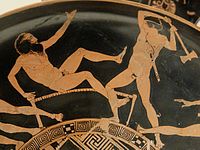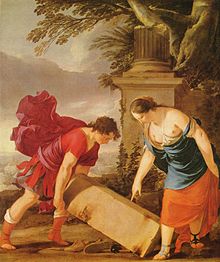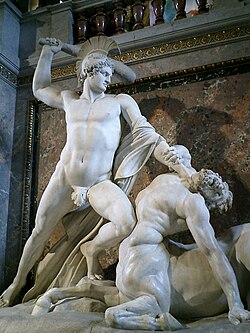Theseus
In Greek mythology, Theseus (in ancient Greek, Θησεύς Theseús 'he who founds') is a king of Athens, son of Aethra and Aegeus, although according to another tradition his father was Poseidon, the god of the sea.
Theseus was the founding hero of Athens, as Perseus or Cadmus were for other city states of Antiquity. His adventures are narrated in the Life of Theseus , by Plutarch, based on other older writings. The myth of him is also recreated in later works. For example, he is one of the main characters in A Midsummer Night's Dream and The Two Noble Knights , by William Shakespeare.
Origin and youth
King Aegeus, who had had no offspring with his wife, consulted the oracle at Delphi, who replied:
Do not open your dart until you return to Athens.
He did not understand the oracle, but Pittheus, king of Troezen and father of Etra, did. The oracle had meant that if he arrived in Athens without having made love, the first woman he lay with would have an heir from him. As Pytheus wanted his daughter to give birth to the heir to the Athenian throne, he got Aegeus drunk, and thus managed to impregnate Aethra.
On the night she became pregnant, she was also believed to have been possessed by Poseidon. The god surprised her on the island of Sphere, where she had gone, due to a dream, with the purpose of offering libations on Sphero's tomb. For this reason, Etra dedicated a temple to Athena Apaturia on the island and called the island Hiera instead of Spheria, also introducing among the maidens of Trocen the custom of dedicating their zonules (girdles) to Athena Apaturia on the day of their marriage. According to Plutarch, Pittheus spread this version only so that Theseus would be considered the son of Poseidon, who was highly revered in his land. Aegeus returned to Athens and Aethra raised his son in Troezen.
After the conception of Theseus, Aegeus decided, for fear of the Palantids —his nephews, who wanted the throne—, that his son should not spend his childhood with him and hid his sword and sandals under a rock that the boy did not I had to move until I was strong enough. Thus, Theseus's childhood was spent in the company of his mother and his grandfather in the city of Troezen. When he was sixteen years old, his mother revealed the secret of his paternity to him and, at this age, Theseus was able to lift the stone, put on his sandals and sheath his father's sword and begin his journey to Athens to be recognized as the son of the king..
Trip to Athens
Theseus, who from a very young age had stood out for his strength and courage, decided to go to Athens alone to meet his father without fearing the dangers that the trip could entail. On the contrary, he wanted to emulate the exploits of his admired Heracles, with whom he would become a good friend.
The first to experience its courage was the giant Periphethes, son of Hephaestus, a highwayman who, despite being lame, perfectly mastered an enormous bronze mace with which he killed travelers: the same mace how useful it would be to Theseus in the future, since he stayed with her after killing him.
Another of the giant bandits that he had to face on his journey was Sinis, the pine bender, who had a peculiar way of getting rid of his prey: he would bend two nearby pine trees, tie the tops together and an arm of his victim to each of them. Then he released the trees, which when they straightened violently tore at the body of the unfortunate man. Theseus, after killing Sinis in the same way that he murdered his victims, maintained relations with his daughter Perigune, from whom he had a son: Melanippus.
Then he had to face Scyrus, son of Pelops and descendant of Tantalus, who forced travelers to wash his feet in the sea. With a brutal kick he threw them into the waters, where a huge turtle at the service of Hades devoured them. Theseus refused and, seizing him by the feet, threw him into the sea.
Near the town of Eleusis, a bandit named Cercyon challenged travelers to fight him in an unequal duel and no one defeated him. Only Theseus did, picking him up and throwing him fatally to the ground.
Not far from there lived another giant, Procrustes, a bandit innkeeper who had the habit of offering travelers a special bed. He first seduced them, tied them to the bed and gagged them; in it he would then begin an atrocious torture. He would put the tall ones in a small bed and cut off their excess legs and head; He put the little ones in a big bed and stretched out their arms and legs with ropes and hammer blows. Theseus killed him the same way he killed his victims: he seduced him with games, bound and gagged him on the smallest bed, given his height. Then he tortured him with the hammer, cutting off his feet and finally his head. He also slew the Chromium Bristle, who was a fierce daughter of Typhon and Echidna.
Theseus continued his journey and arrived in Athens, but he encountered a problem: his father had married Medea, Jason's wife. From this union was born a son who had been called Medo.
In Athens
Faced with this unexpected situation, Theseus decided to wait a bit before making himself known. But Medea, who was a sorceress, recognized him and saw in him a danger for her son to accede to the throne of Athens. So he made a plan.
The young man had gone to the palace incognito precisely to avoid his stepmother's tricks, which she took advantage of to convince Aegeus that the newcomer was a traitor. The king then set out to get rid of him by ordering him to fight the Cretan Bull at Marathon.
But the bull was defeated and Theseus was invited to a banquet in the palace to celebrate the victory. Once there, Aegeus put the poison that Medea had given him in the boy's cup, but chance saved his life. To cut the meat, Theseus drew the sword that his mother had given him. Then Aegeus recognized the weapon, understood what was happening, and snatched the cup from his son's lips. Having failed in her undertaking, Medea decided to flee with her son Medo from her or she was expelled by her husband.
Theseus was officially recognized as the son and successor of the king, which provoked the rebellion of the sons of Pallas (Aegeus's brother), the Palantidas, since one of them would have been the successor if Aegeus had not had offspring. Theseus, showing off his military cunning, managed to corner his adversaries and kill a large part of them, and the rest fled. Theseus was acclaimed by all the Athenians and recognized as the future king.
Theseus' journey to the island of Crete
Athens had to send a tribute to King Minos of Crete: it consisted of the sacrifice of seven maidens and seven young men who would be devoured by the monster Minotaur, a condition imposed after the military expedition of Minos against Athens to avenge the death of Androgeo.
Theseus voluntarily presented himself in the third shipment before his father to be allowed to be part of the offering and let him accompany the victims to be able to face the Minotaur.
The ships in which the people offered were going to travel carried black sails as a sign of mourning, but the king asked Theseus that, if he returned victorious, he would not forget to change them for white sails, so that he would know, even before he reached port, which was alive. Theseus promised him.
During the voyage, Minos, who was also on the expedition, fell in love with a young woman named Eribea or Peribea, according to sources. Minos wanted to join her by her strength and Theseus opposed him. In the ensuing dispute Minos indicated to Theseus his divine filiation, and obtained from his father Zeus thunder and lightning. Theseus replied that he too had divine affiliation, since he was actually the son of Poseidon. To prove this filiation, Theseus had to jump into the water and find a gold ring that King Minos had thrown into the sea. Theseus, in the sea, was led by dolphins to the presence of Amphitrite, wife of Poseidon, who gave him the ring and a crown.
Theseus and the Minotaur
Arriving in Crete, Princess Ariadne fell in love with Theseus and offered to help him defeat her brother—the Minotaur—in exchange for him taking her back to Athens and making her his wife. Theseus accepted.
Ariadne's help consisted of giving Theseus a ball of thread that he tied at one end to the door of the labyrinth. Another version indicates that Ariadne's help consisted of a crown that emitted a glow and that Dionysus had given her as a wedding gift, or that it could be the same crown that Amphitrite had given her during the trip to Crete.
So Theseus entered the labyrinth until he met the Minotaur, whom he killed with his fists or running him through with a sword. He then picked up the thread and so he was able to get out of the labyrinth and immediately, accompanied by the rest of the Athenians and by Ariadne, he embarked back to Athens, after sinking the Cretan ships to prevent a possible pursuit.
Tour back to Athens
During the return trip Theseus decided to disembark on the island of Naxos or on another island called Dia, and from there he left again without the presence of Ariadne. The reason for this abandonment is controversial: some versions indicate that Theseus abandoned her of her own free will, others say that it was by order of the gods so that she could marry Dionysus.
Spotting the galley from the port of Piraeus in Athens, King Aegeus saw the black sails—since Theseus had forgotten to exchange them for white sails—and, believing his son was dead, he committed suicide by throwing himself into the sea, which thereafter it was called the Aegean Sea.
Theseus then inherited the throne of Athens and years later would marry a sister of Ariadne named Phaedra.
The Amazons
After Heracles obtained the belt of the Amazon Hippolyta in one of his twelve labors, Theseus, who participated in the expedition, kidnapped an Amazon named Antiope, or Melanipa, or Hippolyta. The Amazons then attacked Athens to rescue the kidnapped woman, but they were defeated by the Athenians, with the kidnapped Amazon dying in some versions during the attack.
Theseus married either Antiope, Melanipa, or Hippolyta and had a son named Hippolytus. But later he would end up marrying Fedra, after having abandoned his previous wife. In the version in which Theseus is married to Hippolyta and abandons her, she tries to take revenge by bringing the Amazons to Theseus and Phaedra's wedding with the intention of killing everyone, although she fails to be killed by Theseus' guests..
Hippolytus
Hippolytus, the son that Theseus had with the Amazon, was distinguished by his passion for hunting and violent arts. He revered Artemis, virgin goddess of the hunt, and instead detested the goddess of love Aphrodite. The goddess, offended by the boy's contempt, aroused a terrible passion for him in the heart of Phaedra, who had become the wife of Theseus and therefore stepmother of Hippolytus. While Theseus was absent, Phaedra offered herself to the chaste youth, but he spurned her. The woman, spiteful, hanged herself leaving an incriminating note in which she said that Hipólito had tried to rape her. When Theseus returned and saw the false accusation against her son, he believed in her and called for revenge on Poseidon, who sent Hippolytus a bull that rose from the sea while he was riding in his chariot; the chariot overturned and Hippolytus was dragged by his own horses.
In some versions it was at this time that Phaedra committed suicide, seeing the evil she had caused.
Theseus and Pirithous
Pirítoo had heard about the fame of Theseus and to prove it he stole cattle that belonged to the latter. When Theseus chased him, Pirítoo was ready to face him, but before a mutual admiration arose between them that made them swear eternal friendship.
Theseus and Pirithous were inseparable friends and participated together in warlike feats of their time: they embarked on the expedition of the Argonauts to conquer the Golden Fleece and took part in the Calydonian boar hunt; they were also in the fight of the lapitas against the centaurs, which took place at Pirítoo's wedding, when the drunken centaurs decided to kidnap the women.
They each decided to marry a daughter of Zeus: Theseus with Helen, who was still a child, and Pirithous with Persephone. First they kidnapped Helena and left her in the custody of Aetra, and then they decided to go down to the underworld in search of Persephone. But the god Hades set a trap for them: he invited them to a banquet and, once he had them seated at the table, he left them attached to the seats. When Heracles, in his twelfth labor, went in search of Cerberus, being in Hades, he found them chained. Seeing Heracles, they stretched out their hands towards him, as if they were going to be revived thanks to his strength. Grabbing Theseus by the hand, he managed to lift him up, but he had to abandon Pirítoo since, when trying to lift him up, he trembled the earth, so he stayed forever in the underworld.
While Theseus was in Hades, the Dioscuri, Helen's brothers, freed her sister, took Aethra (Theseus's mother) as a slave, made Demophon and Acamante (the children Theseus had had with Phaedra) flee) and put Menestheus on the throne of Athens.
Death
After being rescued by Heracles from the underworld, he returned to Athens, but was expelled from there by Menestheus and decided to settle in Scyrus, where he also had possessions.
The inhabitants of Scyrus received him cheering him, for which, despite Zeus's efforts to take care of him, Lycomedes, king of the island, decided to kill him. To do this, he made her fall off the top of a precipice. In other versions, Theseus' death was an accident.[citation needed]
It is said that an oracle had ordered in the year 476 a. C. take the bones of Theseus from the island to Athens. Indeed, the supposed bones were taken to Athens by Cimon and kept in the Theseion.
Contenido relacionado
Basilisk (mythological creature)
Hanan Pacha
Vulcan (mythology)




